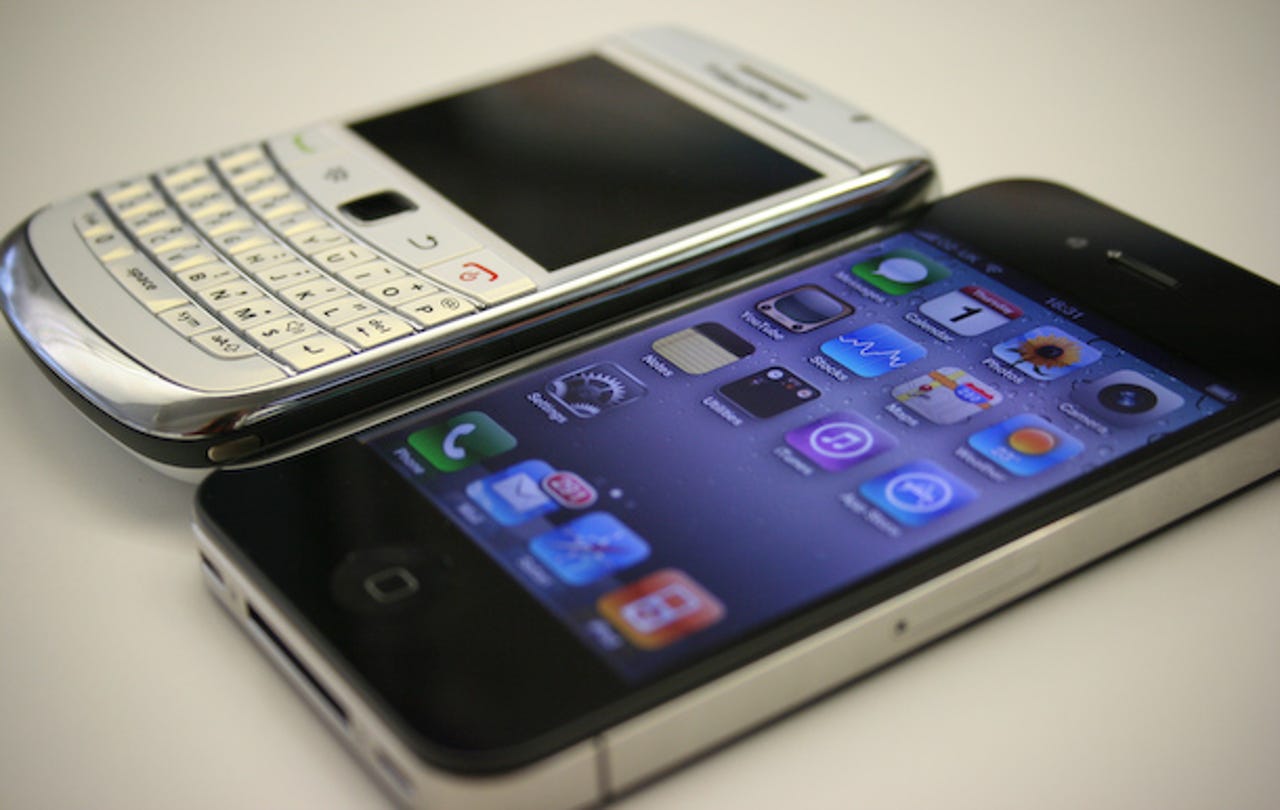UK is a nation of smartphone addicts that can't hang up - even in the loo

Social networking keeps us stuck to our devices...
Smartphone ownership is soaring in the UK - with many teens and adults alike now unable to put down the phone, even on holiday or in the bathroom or toilet.
According to research conducted by telecoms regulator Ofcom, 27 per cent of adults and 47 per cent of teens now own a smartphone, with the majority - 59 per cent - having acquired their handset in the past year.

iPhone and BlackBerry are the top two smartphone brands in the UKPhoto: Natasha Lomas/silicon.com
The top three uses for a smartphone by adults are email, internet surfing and social networking. For teens it is social networking, listening to music and playing games.
The most popular brand of smartphone is Apple's iPhone, owned by a third - 32 per cent - of adults. RIM's BlackBerrys also have a significant share, taking a quarter - 24 per cent - of the market.
BlackBerrys are particularly popular with the youth and young adult market, with more than a third - 37 per cent - of 16- to 24-year-olds owning a RIM device. Female teens are most likely to own a BlackBerry, with close to half - 44 per cent - having one. According to Ofcom, anecdotal evidence suggests the popularity of BlackBerrys among teens is down to RIM's BBM messenger service, which offers a free alternative to texting.
Ofcom's research - the Communications Market Report 2011 - also found smartphone users get more use out of their device than traditional mobile owners, with smartphone users making significantly more calls and sending more texts than their counterparts with traditional devices. A whopping 81 per cent of smartphone users make calls every day compared to 53 per cent of regular mobile users, the research found.
The stickiness of smartphones also means a significant portion of users reckon they are "addicted" to their device. More than a third - 37 per cent - of adults and well over half - 60 per cent - of teens claimed to be "highly addicted" to their handset, the report states.
Ofcom reckons sticky smartphones are also contributing to a further blurring of the line between work and personal life, with almost a third - 30 per cent - of smartphone users saying they regularly take personal phone calls during work hours, compared to 23 per cent of users of bog standard mobiles.
Smartphone users are also more likely to take work calls while on holiday or annual leave, with 70 per cent admitting they have done this, and a quarter - 24 per cent - saying they do it regularly, compared with 16 per cent of standard mobile users.
The research also notes smartphones being used in some other unusual locations, with just over half of adults and two-thirds of teenagers saying they have used their smartphone while socialising with others. Nearly a quarter of adults and a third of teens use their smartphone during mealtimes and more than a fifth of adults and nearly half of teens use or answer their handset in the bathroom or toilet.
On the broadband front, the research found 74 per cent of UK households now have a broadband connection, with a slight rise in both fixed and mobile connections compared to last year. Use of internet on a mobile has grown substantially, with just over a quarter of adults - 28 per cent - now accessing web content on a handheld device. Ofcom said this rise has been driven by the growth in smartphone ownership, and mobile operators offering "competitive mobile data packages".
Meanwhile, take-up of superfast fixed-line broadband services in the UK remains low, with Ofcom estimating only around two per cent of residential and SME broadband connections in the UK had a headline speed in excess of 24Mbps at the end of March 2011. It notes this is more than five times more than the figure for a year previously, however.
Of those who have adopted superfast broadband with speeds over 25Mbps, 80 per cent say they are satisfied with the service, according to Ofcom's research.